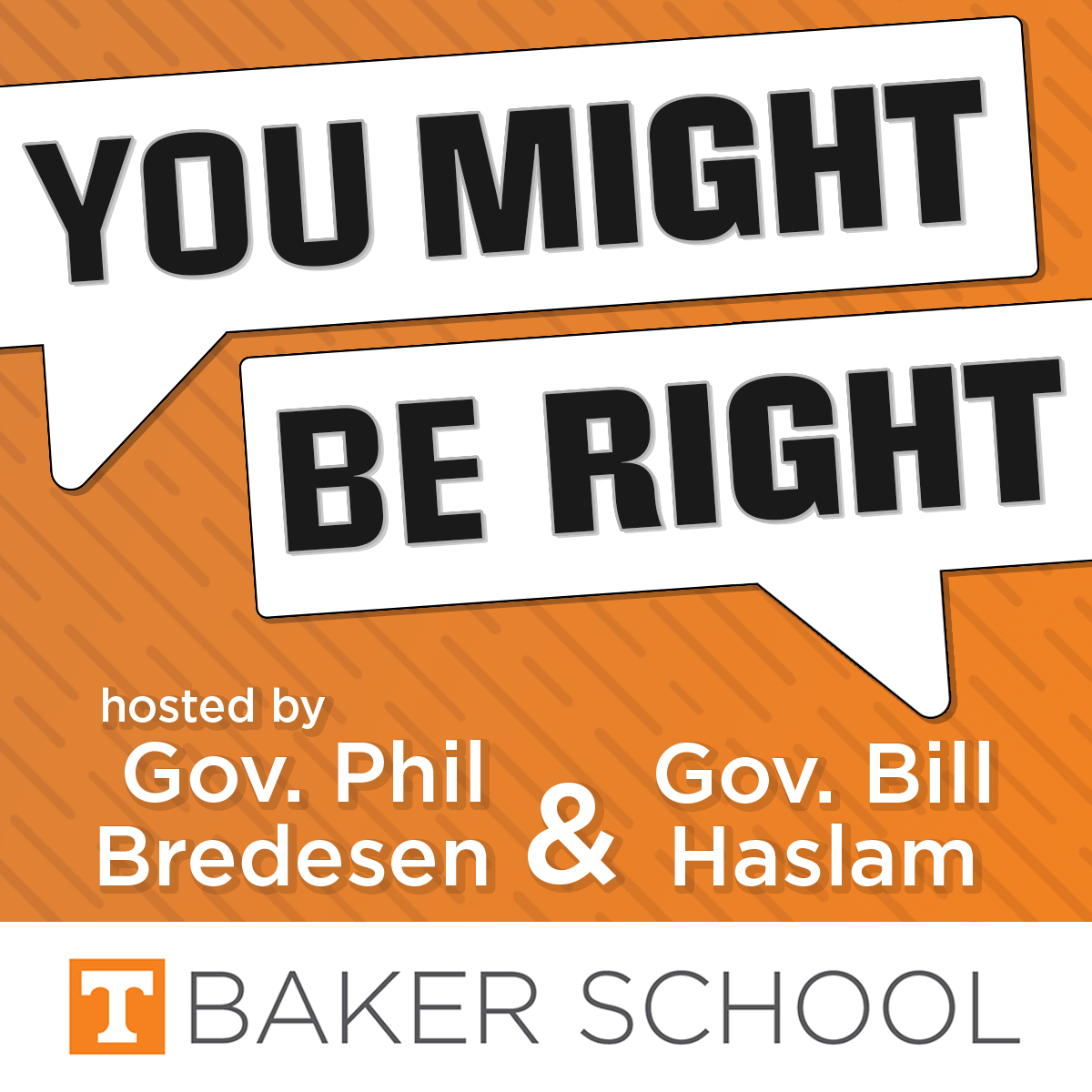What does the research say about polarization?
To kick off the new season, our hosts, former Tennessee Governors Phil Bredesen and Bill Haslam, speak with Rachel Kleinfeld, an international relations scholar and senior fellow in the Democracy, Conflict and Governance program at the Carnegie Endowment for International Peace, about what the research says about the roots and repercussions of polarization in American politics.
Are Americans as divided as we think we are? In Season Five of You Might Be Right, the Governors speak with experts on political polarization, seeking to better understand its impact on our civic discourse and politics and identify solutions that could turn down the temperature and foster more constructive debate.
Subscribe and follow You Might be Right wherever you get your audio content – including Apple Podcasts and Spotify – to never miss an episode, or sign up for our email list to receive new episodes straight to your inbox each week here.
“Our political leaders are quite far apart”
Kleinfeld opened the conversation by distinguishing between affective (or emotional) and ideological polarization. The research on political polarization shows significant levels of affective polarization, an emotional dislike for the other party, but less ideological division among voters than many people perceive, she noted.
What’s causing that disconnect? Kleinfeld explained that while Americans may agree on more than we realize, the members of Congress we elect from both parties have almost no areas of issue agreement.
“We’ve been electing politicians who are much, much more ideologically polarized than most Americans,” she told the governors. “And so when somebody thinks, what does a Democrat look like? Or what does a Republican look like? They think of JD Vance or AOC, and they attribute those beliefs to their neighbors. And those are not their neighbor’s beliefs. Their neighbors are much more in a kind of common sense, messy middle, whereas our political leaders are quite far apart, and that’s causing regular Americans to misunderstand where most other Americans are.”
“It starts with fear”
Why has politics become so emotionally charged, with more Americans agreeing that violence may be necessary to get the country back on track?
“Well, it starts with fear,” Kleinfeld told the governors. “When you have so little policy overlap between your politicians, you’re imagining two very different worlds if the different politicians win… if you’re afraid that the other person winning means your business is going to close down during a pandemic, or it means you’re not going to get to raise your kids the way you believe is right, or it means you won’t get to control your body, very deep feelings, well, then you really worry about the other side winning. So that fear is a strong motivation.”
Another contributing factor is “a political system that’s taking differences between Americans, which are real…and hyper-charging them,” she explained, citing our winner-take-all elections, two-party system, and party primaries, which “lets the most partisan voters, usually 3, 4, 5, 6% of your voters, determine the outcome,” as examples.
Listen to our episodes on the primary system and the role of third-party candidates to learn more about these issues.
“This is not our first rodeo of polarization”
The conversation concluded with a discussion of what we can do to reduce polarization. Noting “there’s a lot we can do about it,” Kleinfeld pointed to changes in our political incentive system, such as the use of ranked-choice voting, as “the most important thing.” She also highlighted the need to reduce how much airtime the media gives politicians she described as “conflict entrepreneurs,” citing work from Dartmouth’s Polarization Research Lab that tracks how the most polarizing rhetoric comes from a very small group of members of Congress, as well as the importance of building relationships with people of different views.
“I think people do need to reclaim their agency that we’re not at the mercy of these huge forces against us. It’s our country. We’ve gone through a lot of bad times before. This is not our first rodeo of polarization…the outcomes can be pretty darn negative,” Kleinfeld said. “What we’ve seen in other countries is that when we allow polarization to get really serious, people start giving their own side a pass on democratic norms. They say, ‘I’m so afraid of the other side that it’s okay if my side breaks a few rules because we have to keep that side out,’ and that’s really dangerous. So it matters, and there are things we can do.”
For more on how to navigate disagreements in everyday life, listen to our episodes with happiness expert Arthur Brooks and the governors of Utah and Colorado about their “Disagree Better” initiative
Subscribe and follow You Might be Right wherever you get your audio content – including Apple Podcasts and Spotify – to never miss an episode, or sign up for our email list to receive new episodes straight to your inbox each week here.

Join the conversation on Twitter by following @UTBakerSchool, @PhilBredesen, and @BillHaslam.


